Historian Dan Jones continues his fascinating journey across Northern France, investigating the 1346 invasion by Edward III and his English army on their Crécy campaign - one of the earliest and bloodiest raids of the Hundred Years War.
In episode one we have seen how, to start with, everything was going well for Edward and his army, including the "Essex Dogs" - the ordinary soldiers who Dan has imagined and researched for his latest book. They had already made a successful landing, ravaged the Norman countryside and sacked the grand city of Caen.
But Edward III's campaign is about to take a turn for the worse. Approaching the mighty city of Rouen, Edward learns that King Philippe VI of France, rather than shying away from action, has reinforced or destroyed all the bridges across the River Seine between the sea and Paris. He’s trying to spring a trap that will allow him to crush the English invaders.
As Edward III’s army is forced deeper and deeper into France, trying to find a way across hostile territory - with supplies running lower - the English troops find themselves in an increasingly desperate situation. They can only survive if they can somehow cross two mighty rivers and either make it to safety, or defeat the French in a pitched battle.
Dan explores the key locations with Prof. Michael Livingston - revealing the real places where the incredible events unfolded - piecing together the details of the story on the perilous riverbanks and battlefields of northern France.
Everything comes to a head by the forest of Crécy - where the English turn to fight and the French charge into a hail of arrows…
It is a moment that will define the next hundred years of history.
Up Next in Medieval
-
Going Medieval: Those Who Work
In the Medieval period, peasants made up roughly 80% of the European population (70% were serfs). In the first episode of Going Medieval, Dr Eleanor Janega visits Denny Abbey, a former Benedictine monastery in Cambridge to explore the lives of those who devoted their lives to working the land.
-
Going Medieval: Those Who Earn
Whilst the majority of people who worked in the Medieval Period were peasants, a significant community of merchants and tradesmen existed, the majority of whom belonged to one of the most powerful and influential groups in medieval Europe - the Guilds. Guilds were associations of artisans and mer...
-
Going Medieval: Those Who Pray
One of the most unifying elements of the Medieval Period was the Roman Catholic Church. All classes and ranks of people, whether that be nobles, peasants or tradesmen, were profoundly affected by the rulings of the church. A hierachy existed within the clergy. Following the pope, in order of rank...




46 Comments